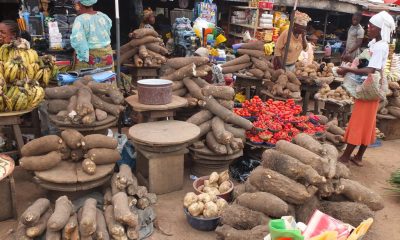Health
WHO: Malaria Killed over 602,000 People in Nigeria, Others in 2021

•US spends $768m to fight malaria in country
*ExxonMobil spent over $37.4m on anti-malaria programmes in nation in 20 years
•Obaseki canvasses innovative financing in the disease fight
As the world yesterday marked the World Malaria Day, the World Health Organisation (WHO) has disclosed that no fewer than 602,000 people died of malaria in Nigeria and other African countries in 2021.
WHO’s Regional Director for Africa, Dr. Matshidiso Moeti, stated this yesterday, in her message to commemorate this year’s World Malaria Day titled: “Harness innovation to reduce the malaria disease burden and save lives.”
She noted that, “Malaria remains a significant public health and development challenge. In the last year, about 95 per cent of the estimated 228 million cases occurred in the WHO/AFRO Region, along with 602,020 reported deaths.
“Six of our countries, the worst-impacted by malaria in the region, are reported to have accounted for up to 55 per cent of cases globally, and for 50 per cent of these deaths.”
The commemoration of World Malaria Day is marked annually to focus global attention on the disease and its devastating impact on families, communities, and societal development, especially in Sub-Saharan Africa.
Moeti said the past year saw significant breakthroughs in malaria prevention and control, in spite of the COVID-19 pandemic.
“Despite some slowing of progress to reduce malaria cases and deaths, and the disruptions to health services caused by COVID-19, we are still much further ahead than we were in 2000. We need to reignite that momentum and build on the recent advances.
“The ultimate goal is to reduce the number of people catching and dying from malaria. This requires a focus on research and on leveraging available evidence to ensure that our targeted interventions are an efficient use of resources, which produce measurable results,” she added.
However, the United States yesterday disclosed that it spent $768 million from 2011 to date to fight the disease in Nigeria.
READ ALSO:
- Bride slaps groom twice during wedding, walks away + Video
- DPO arrested, detained after shooting Lagos returnee in Imo
- Chrisland: 10-year-old pupil deletes social media videos, apologises
Precisely, in 2021 alone, the United State revealed that it spent $74 million on malaria scourge despite the outbreak of COVID-19 and new demand on combating the global challenge of the pandemic.
A statement yesterday, by US Embassy in Nigeria, stated that the US President’s Malaria Initiative (PMI) had partnered with Nigeria to fight malaria since 2011, contributing $768 million to date and $74 million in full year 2021.
The PMI’s Annual Report, released yesterday showcased how the strong partnership between the United States and Nigeria enabled robust and effective malaria services to continue in FY 2021, even as COVID-19 caused enormous strain on the health system.
It added that: “Through PMI funding and programmes, 58 million bed nets, 130 million fast acting medicines, and 82 million malaria test kits have been delivered to clinics and communities since 2011.
“In addition, 24 million preventive treatment doses were delivered to pregnant women and 13 million doses to children during the rainy season. In the past year, more than 3,666 health workers received training that amplified their ability to detect and treat malaria, while strengthening the health system overall and providing key skills to fight COVID-19 and future pandemics.”
The statement quoted the USAID Mission Director Anne Patterson to have said: “I think what Nigeria is doing to advance more effective malaria prevention, treatment, and control is so important, especially the introduction of innovative tools to make better use of the data in real-time, and also to enhance quality of care via community-based health workers.”
Assisted by PMI investments, Nigeria is progressing its fight against malaria using proven and cost-effective methods that save lives and promise a healthier and prosperous future for families and communities, according to the statement.
ExxonMobil Spent over $37.4m on Anti Malaria Programmes in Nigeria in 20 Years
In a related development, American oil and gas giant, ExxonMobil, said it invested more than $37.4 million or over N15 billion in Nigeria-based malaria programmes since 2002 through its humanitarian organ, the ExxonMobil Foundation.
It explained that the fund was spent in cash grants to partners working to develop community-based solutions in Nigeria since 2002.
The international oil company (IOC) said in the last 20 years, the foundation had embarked on funding community education, providing tools for prevention and treatment of the disease and training of health workers, adding that its 2022 grant recipients focused on leveraging the power of sports to engage Nigerian youth.
The foundation in collaboration with ExxonMobil affiliate companies in Nigeria, also announced renewed support for partner organisations committed to ending malaria in Nigeria.
In a statement issued yesterday, it explained that these grants, among other scheduled activities for World Malaria Day, marked the 20th anniversary of ExxonMobil’s support for programmes to reduce the burden of malaria in Nigeria.
Marking its 20th year of malaria fight in Nigeria and in continuation of this legacy, the oil major has, however, announced its 2022 grant recipients.
They included PanAfricare, in conjunction with NBA Power Forward, to foster the development of youth in Nigeria through sports, life skills and malaria education; and Grassroot Soccer, to use the convening power of soccer to increase awareness of malaria and HIV/AIDS among young people across Nigeria through sports curriculum.
READ ALSO:
- Bus Tumbles As Gunmen Enforcing IPOB’s Sit-At-Home Order Create Scare In Imo
- Vigilantes nab three suspected kidnappers in Kogi
- Wike Woos PDP Delegates In Kaduna, Donates N200m To Victims Of Banditry
Another recipient is Harvard T.H. Chan School of Public Health, aimed to advance scientific knowledge and understanding to advance progress toward the eradication of malaria.
“This World Malaria Day, we mark ExxonMobil’s contributions over the past two decades that have helped equip and strengthen resilience within our communities to fight against malaria.
“Thanks to these efforts, Nigeria is better prepared to continue the progress we have made and work toward a malaria-free future,” Chairman and Managing Director, ExxonMobil affiliate Companies in Nigeria, Mr. Richard Laing, said.
ExxonMobil’s Malaria Initiative works with nonprofit partners and leading global health organizations to advance progress against the disease in malaria-endemic countries by supporting malaria education and awareness, improving access to tools for prevention, diagnosis and treatment, strengthening health infrastructure and advancing research and innovation.
The initiative continues to support malaria prevention and control programs in Nigeria, a country which currently accounts for more than one quarter of the global burden of the disease.
In honor of World Malaria Day, the company said these partners were focused on leveraging the power of sports and media to reach Nigerian youth, through malaria-themed tournaments and creative radio, television and school-based malaria campaigns, among other activities.
Obaseki Canvasses Innovative Financing in Anti-malaria Fight
Meanwhile, Edo State Governor, Mr. Godwin Obaseki, has urged stakeholders to explore innovative approaches to financing efforts and technologies for the prevention and control of malaria disease so as to realise the global zero malaria target.
The governor made the call in commemoration of World Malaria Day, yesterday, to highlight the need for continued investment and sustained political commitment to malaria prevention and control.
Obaseki urged youths to support the global effort to eliminate malaria by developing innovations and technologies for the prevention and treatment of the disease.
Obaseki noted, “As we commemorate this year’s World Malaria Day, we must reinforce efforts and strengthen alliances to reduce the burden of the malaria disease, one of the world’s oldest and deadliest diseases estimated to have claimed over 627, 000 lives in about 85 countries in one year.
“While governments across all levels intensify efforts at improving community-focused malaria interventions, especially in hard-to-reach communities, global stakeholders must strive to bridge the funding gap in achieving a future free of malaria by exploring innovative approaches to stimulate investments in the prevention and control of the disease.
“If the 2030 zero-malaria target must be achieved, we must embrace multi-sectoral collaborations, public-private partnerships and technology-led solutions, leveraging on the innate potential of the youths, to establish a robust malaria control programme, ensuring the prevention, detection and cure of the disease.”
The governor, who noted that his government had embarked on interventions, including the distribution of treated mosquito nets, advocacy and others to ensure that the people are properly equipped to fight malaria, said the state is revamping its health system to bring quality primary healthcare closer to citizens.
He noted that his administration had also ramped up the construction of primary healthcare centres at the ward level across the state, ensuring that each centre is equipped with the right manpower and equipment to sustain the campaign against malaria and other infectious diseases.
THISDAY
Health
NAFDAC destroys N5bn fake, expired products in Aba

NAFDAC destroys N5bn fake, expired products in Aba
The National Agency for Food and Drug Administration and Control (NAFDAC) has shut down 150 shops at Eziukwu Market in Abia over fake and expired products Worth N5 billion.
The agency disclosed this in a statement on Wednesday on X.
NAFDAC said the shops were shut during a two-day operation on December 16 and 17, while products valued at N5billion were destroyed at the market.
The director of the South-East zone, Martins Iluyomade, expressed dismay at the continued illegal activities despite a previous undertaking signed by market leaders in December 2023 to expose counterfeiters.
READ ALSO:
- Speaker Abbas to Tinubu: Your reforms have disrupted status quo
- Abuja demolition: Soldiers attack FCTA officials, seize vehicles
- Onion price rises over 100%, flooding, inflation blamed
According to the statement, Mr Iluyomade described the market as a hub for counterfeit and substandard products.
“Our team uncovered a large-scale production and distribution of fake and expired goods, including beverages, carbonated drinks, wines, spirits, and vegetable oils.
“Revalidated food items such as milk, yoghurt, noodles among others were also destroyed,” the statement said.
It reaffirmed NAFDAC zero tolerance for such practices and emphasised its unwavering commitment to safeguarding public health while working toward a permanent solution to the problem of counterfeiting in the market
NAFDAC destroys N5bn fake, expired products in Aba
(NAN)
Health
Eating fish regularly minimises risk of incurable hearing condition – Study

Eating fish regularly minimises risk of incurable hearing condition – Study
Tinnitus is the sound of ringing in the ears. It may also be described as roaring, buzzing, hissing, or clicking inside the head. The sounds may come and go. Or they may be ongoing. The sounds range in severity from a mild distraction to a disabling condition and may manifest with buzzing, hissing, or clicking inside the head.
The sound may happen in one or both ears and may have different tones. A team from Brigham and Women’s Hospital in Boston studied 73,000 individuals to understand how common this disorder is, which affects millions with a constant ringing in their ears.
Over a span of 30 years, those who consumed more than two servings of fish weekly had nearly 25 percent lower odds of getting tinnitus compared to those who seldom or never ate fish. Even eating just one serving a week resulted in a 13 percent reduced risk.
Certain types of fish, like tuna, light-fleshed varieties such as cod or halibut, and shellfish, were linked to a reduced risk, while darker fish like salmon and swordfish seemed to increase the risk.
READ ALSO:
- No litigation delaying Lekki int’l airport construction, says Lagos govt
- Ondo: Jilted husband kills self, sets wife ablaze
- Military sends Special Operations Brigade to quash Lakurawa terrorists
Interestingly, fish oil supplements, known for their benefits to heart, brain, and joint health, were also connected to a higher risk of tinnitus. It’s estimated that tinnitus is diagnosed in almost 1 in 6 persons.
While age-related hearing loss, ear injuries, and circulation issues are known to contribute to tinnitus, the exact cause remains unclear. Previous studies have suggested that dietary factors, such as high levels of calcium, iron, and fat, might heighten the risk. However, this new research is the first to analyse data over such a lengthy period.
Past findings have also shown that seafood can lower the risk of hearing loss, with one study suggesting that increased fish consumption might reduce hearing issues by up to 20 percent. Scientists believe that the omega-3 fatty acids in fish could protect inner ear cells or reduce inflammation caused by loud sounds, chemicals, or infections.
The Boston team’s investigation, based on a database of US nurses, aims to shed light on the connection between fish consumption and tinnitus, potentially aiding future patients. The authors of the study expressed hope that identifying factors that can be changed might help in preventing tinnitus and guiding targeted treatments.
Eating fish regularly minimises risk of incurable hearing condition – Study
Health
Nigerian doctor claims increased s3xual activity lowers cancer risk for women

Nigerian doctor claims increased s3xual activity lowers cancer risk for women
Dr. Rasheed Abassi, a Nigerian medical practitioner, has sparked widespread debate following comments on TVC’s programme Your View, where he recommended increased sexual activity for women as a way to reduce the risk of breast cancer.
The doctor also advised men to consider polygamy, citing its potential health benefits, including a lower risk of prostate cancer.
“Women need to have more sex to reduce breast cancer risk. When a woman reaches orgasm, she releases oxytocin, which lowers her chances of developing cancer,” Dr. Abassi stated during the interview.
READ ALSO:
- Four suspected suppliers of soldier, police uniforms to bandits arrested in Katsina
- Ogun father arrested for allegedly killing two-month-old son for ritual
- Midnight fire guts popular Alaba Rago Market in Lagos
Addressing men’s health, Dr. Abassi claimed that polygamy could improve longevity and reduce prostate issues. “Men with two to three wives live longer than men with one wife. If your son is not getting rid of his DHT (dihydrotestosterone), he is likely to develop an enlarged prostate,” he said.
He also linked the absence of regular erections to potential cardiac problems. “Any man not waking with a full erection already has cardiac issues. My oldest patient is 92 years old and has a four-year-old daughter — and that’s DNA-proven,” he revealed.
When asked about the risks of sexually transmitted infections (STIs) associated with increased sexual activity, Dr. Abassi emphasised the importance of safe practices. “The condom is not 100% protective, but we still advise it. Awareness is key,” he said.
He also noted that some men cite the cost of contraceptives as a challenge, comparing it to the financial costs of engaging in sexual activities.
Nigerian doctor claims increased s3xual activity lowers cancer risk for women
-

 Business2 days ago
Business2 days agoBe creative, monarch, others challenge Muslim professionals on economic revival
-

 Auto1 day ago
Auto1 day agoLSM MD extols founder’s qualities after latter posthumous industry award
-

 Entertainment2 days ago
Entertainment2 days agoMultiChoice announces free access to all DSTV channels for 3 days
-

 metro2 days ago
metro2 days agoJigawa State governor loses son 24 hours after mother’s death
-

 News1 day ago
News1 day agoNigeria Customs Service begins 2025 recruitment [How to apply]
-

 metro1 day ago
metro1 day agoHeavy security in Ilesa as ex-Osun deputy gov emerges new Owa-Obokun
-

 metro1 day ago
metro1 day agoLagos Imam to Tinubu: You haven’t disappointed us
-

 metro1 day ago
metro1 day agoDangote, Tinubu, Lookman named among 100 most influential Africans in 2024 (Full list)











